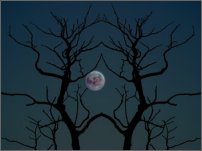Does the Moon Really Affect Your Moods? Your Health? Your Sanity? Your Fangs?
by www.SixWise.com
There's something about a full moon that conjures up spooky
images of werewolves, insane ax-wielding murderers and other
odd and unexplainable behaviors. Everything from horror films
to Halloween cards has capitalized on this phenomenon, making
it almost commonplace in our minds. But does the moon really
affect human behavior, or does this notion only exist in our
imaginations?
|

One study in Florida found that murder rates increase
when there's a full moon.
|
The Moon and Murder
Ever heard the term "lunacy"? It's actually defined
in the Merriam-Webster Online Dictionary as "intermittent
insanity once believed to be related to phases of the moon."
In fact, in England in the 18th century, a person who committed
a murder during a full moon could plead "lunacy"
and get a lighter sentence.
Back in the 1970s, a study was published in the Journal of
Clinical Psychiatry that found some interesting results. Homicides
in Dade County, Florida appeared to rise and fall with the
phases of the moon over a 15-year period. In other words,
the murder rate rose with the full or new moon.
The study's author, psychiatrist Arnold Lieber, theorized
that since humans are composed mostly of water (like the earth),
our bodies might have "biological tides" that influence
our emotions. He even wrote a book about it called "How
the Moon Affects You."
Medical Workers Unite Against the Full Moon
Hospital workers especially seem to notice increases in strange
behaviors with the full moon. A study published in the Journal
of Emergency Medicine in 1987 found that 80 percent of emergency
room nurses and 64 percent of physicians agree that the moon
affects their patients' behavior. In fact, the nurses
were so overwhelmed by their workload during the full moon
that they asked for bonus "lunar pay."
Another study in 1995 by the University of New Orleans found
that 43 percent of participants believed in the moon's affect
on behavior. Who agreed most strongly?
Full Moon Means More New Mothers?
"It's not supported by empirical evidence," said
Debbie Fugett, a labor and delivery nurse at CoxHealth. "But
on the night when there's a full moon, we're just a little
bit nervous of what to expect."
|

Some experts say our culture just uses the full moon
as a scapegoat for strange behaviors.
|
Many hospital workers express similar notions; that when
the moon is full, there are more admissions for everything
from births to violent crimes.
But, when put to the test, no link was found, according to
a study in the May 2005 American Journal of Obstetrics and
Gynecology. In a review of more than 500,000 births in North
Carolina, no link was found between births and the lunar cycle.
"We really don't know what starts the process of labor,
but we do know that whatever it is, it probably has nothing
to do with the phases of the moon ... So while it may be
fun to consider the full moon closest to your due date as
the future 'birthday' for your baby, you'd have as good a
chance of being right as throwing a dart at your calendar,"
said co-author Shelley L. Galvin.
Is it All Just Hype?
Ivan Kelly, a Canadian psychologist at the University of
Saskatchewan in Saskatoon, Saskatchewan, has published 15
papers on the lunar effect and reviewed more than 50 others
(one of which involved 200 studies).
"My own opinion is that the case for full moon effects
has not been made ... The studies are not consistent. For
every positive study, there is a negative study," he
said.
Indeed, it does appear that many studies contradict each
other. An English study, for instance, found that your odds
of being bitten by an animal were twice as high on full-moon
nights. Another similar study, this one in Australia, found
no relationship whatsoever between dog bites and the full
moon.
Is it possible that we, as a culture, like the idea of a
mysterious moon-related power, and are pushing the myth forward
because we want to? It could be, according to Eric Chudler,
a psychologist at the University of Washington in Seattle.
"When something unusual happens and there is a full
moon, people might notice the moon and assign blame,"
he said.
Although medical workers throughout the nation may disagree,
Scott Brandhorst, a licensed psychologist at the Robert J.
Murney Clinic of Forest Institute of Professional Psychology
expressed a similar sentiment.
"It's one of the myths that have been passed along through
generations ... We, as a society, use the full moon to
account for someone's behavior," he said.
Recommended Reading
The
Six Worst Lifestyle Choices You Could Make
Why
are More Boys than Girls Being Born?
Sources
Open
Mind
National
Geographic News
DrWeil.com
News
Leader
Reuters:
Births do Not Rise During Full Moon
Full
Moon and Human Behavior